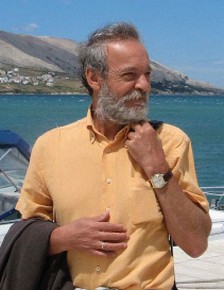
Srđan Hofman (1944, Serbia), earned his BA and MA degrees in composition at the Music Academy in Belgrade under the supervision of Stanojlo Rajičić. He began his teaching career at the Josip Slavenski School of Music in 1968. Since 1974, he has taught composition and orchestration at the Faculty of Music Art. His composition class has produced a large number of established artists, who play active parts on Serbia’s artistic and cultural scene. Hofman also founded the Faculty’s sound studio. He has served as the Faculty’s vice-dean and dean and pro-rector of the University of Arts in Belgrade (In Serbian universities, the highest administrative office is that of the rektor (rector) and is assisted by a number of prorektori (pro-rectors). Similarly, each Faculty (or Department) of a university is governed by its dekan (dean), assisted by a number of prodekani (vice-deans) – Translator’s note). In addition to composing, he also engages in theory work related to issues in contemporary music. Works by Hofman have been performed at the most important national and international festivals of contemporary music (Belgrade, Ohrid, Opatija, Zagreb, Bourges, Helsinki, Stockholm) and in regular concert repertoires in the Netherlands, Poland, France, Austria, Australia, Great Britain, and the US. Some of his pieces have been included as obligatory at the Jeunesses musicales competitions (his Monodrama for violoncello and Farsa /Farce/for piano trio). He is a co-founder of the International Review of Composers and secretary general of the Serbian Section of the International Society for Contemporary Music. He has received many awards for his work in composition.
Among his early works, especially noteworthy are the Movimento energico (1968), Simfonija u dva stava (Symphony in Two Movements, 1969), Concerto dinamico (1971), and Koncertne epizode za violinu i klavir (Concerto Episodes for Violin and Piano, 1972). The cycle Heksagoni (Hexagons) comprises his Monodrama for solo violoncello (1975), Pastorala (Pastoral, 1975) for solo violin, Farsa (Farce, 1976) for violin, violoncello, and piano, and Ritual for six female groups, Orff’s instruments, and a conductor (1978). Among his chamber works, outstanding are Pokretna ogledala (Mobile Mirrors, 1979) for two pianos and four performers, Dolazi! (It Is Coming!, 1981) for seven strings, Refren (Refrain, 1983) for wind quintet, Hadedas (2005) for violoncello and piano, and Muzičke igračke (Music Toys, 2008) for amplified instruments, violoncello, and double bass. He has also composed the song cycle Cantus de morte (1978) and electro-acoustic works Déjà vu (1985), Ko sam ja? (Who Am I?, 1986), Rebus 1 and 2 (1988 and 1989), Samples (1991), Koncertantna muzika (Concertante Music, 1993), and Znakovi (Signs, 1994).
His piece Gledajući u Ogledala Aniša Kapura (Looking at the Mirrors of Anish Kapoor) for two amplified harps and sound processors won the 2010 Mokranjac Award.
Here is how the jury explained their unanimous decision: ‘With his accomplishments in the domain of electro-acoustic music, Srđan Hofman has established himself as a leading author in Serbian musical culture, with his captivating ingenuity and expert “command” of his chosen media’s expressive potentials. Hofman realised his idea to re-signify Kapoor’s intriguing work from the Guggenheim museum in Bilbao (Mirrors, 2010) in his own typically complex way, using the full expressive potential of two harps, whose sound is “mirrored” and transformed in the computer sound generated in performance by transferring the sound from the stage into a prepared computer software. The impressive sonic result, the work’s balanced dramaturgical arc, the solid logic of its musical organisation, and Hofman’s expert use of expressive options single out this piece as one of a masterly, mature compositional writing, an exciting and inspiring sonic quest in the area of combining traditional instruments with computers’.


